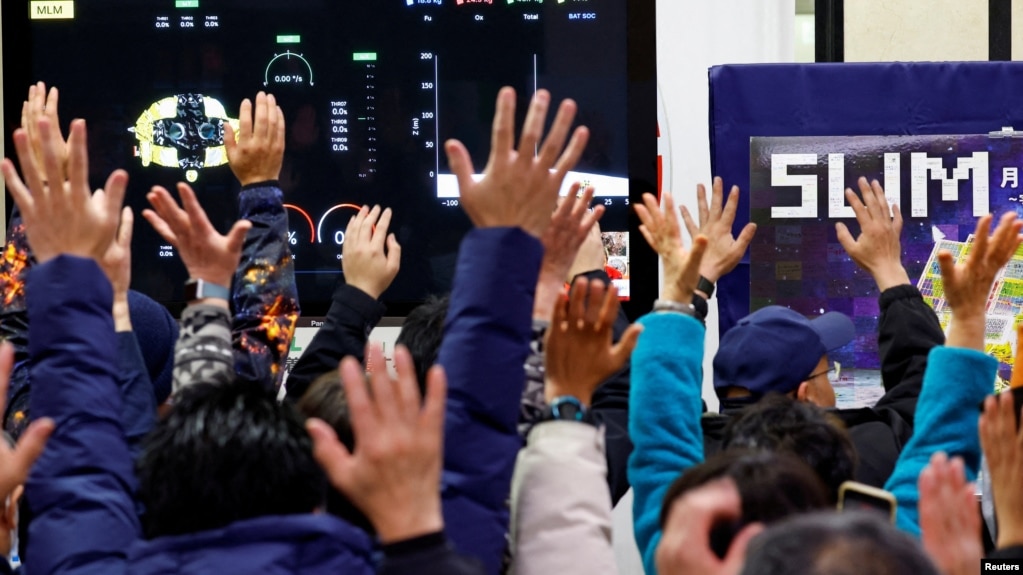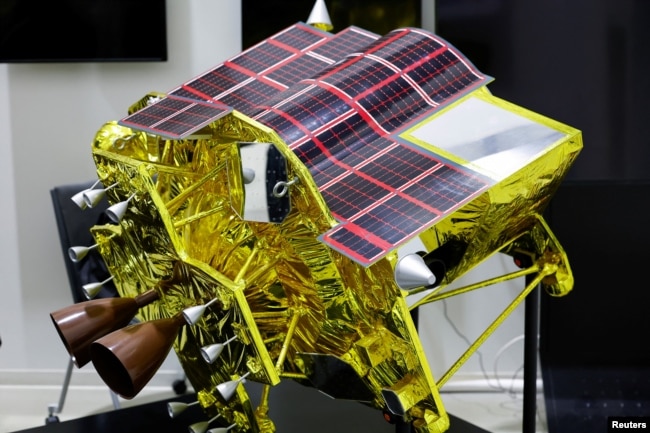AUDIO
Japan's Moon Vehicle Lands Successfully but Is Losing Power

Japan on Friday became the fifth country to land a spacecraft on the moon. The mission’s aim was to carry out an exact landing and to collect information about the Earth’s only natural satellite.
Japan’s space agency, known as JAXA, said its Smart Lander for Investigating the Moon, called SLIM, landed on the moon’s surface at 15:20 UTC Friday. It then re-established communication with Earth. But its solar panels were not able to create electricity, possibly because they are pointed in the wrong direction.
"SLIM is now operating only on its battery, and we are prioritizing the transfer of its data to Earth," Hitoshi Kuninaka, the head of JAXA's research center, told reporters.
A battery is a device that stores electricity.
Space officials are attempting to save power by turning off equipment like its heaters. But SLIM’s battery only lasts “a few hours.”
JAXA hopes a change in the sun’s position in the sky will cause the panels to receive sunlight to power the vehicle, Kuninaka said. He added that it takes 30 days for the direction of sunlight to change on the moon.
SLIM attempted to land within 100 meters of its target, instead of within several kilometers. JAXA said this exact landing technology will become a powerful tool in the search for oxygen, fuel, and water on the moon.

A miniature model of the Smart Lander for Investigating Moon (SLIM) is displayed at Japan Aerospace Exploration Agency (JAXA)'s facility in Sagamihara, south of Tokyo, Japan, January 19, 2024. (REUTERS/Kim Kyung-Hoon)
Landings on the moon
Japan aims to play a bigger part in space, partnering with ally the United States. Japan is also home to several private space companies. JAXA aims to send an astronaut to the moon as part of NASA’s Artemis program in the next few years.
But the Japanese space agency has recently faced several setbacks in rocket development. They include the launch failure in March of its new H3 rocket which is meant to compete with rockets made by private companies like SpaceX.
The failure caused delays in Japan’s space missions, including SLIM and joint moon exploration with India. India made a historic landing on the moon’s most southern point with its Chandrayaan-3 probe.
JAXA has twice landed on asteroids, but the moon’s gravity makes landing on it more difficult, its scientists said. Three missions to the moon by Japanese company ispace, Russia’s space agency, and American company Astrobotic have failed in the past year.
Only four nations, the former Soviet Union, the United States, China and India, have successfully carried out a soft landing on the moon. No private company has been able to do it.
SLIM measures 2.4 meters by 2.7 meters—about the size of a car. It has two main engines, along with 12 smaller thrusters. It also includes equipment like solar cells, radar, and cameras.
SLIM weighed 700 kilograms at launch. That is less than half the weight of India’s Chandrayaan-3.
As the probe got closer to the surface, it was designed to compare its camera’s images with satellite photos of the moon. JAXA has said this method permits an exact landing.
On landing, reports say SLIM successfully released two small robot probes. One moves by taking small jumps, or hops. The other is an even smaller baseball-sized wheeled vehicle. Sony Group and toy company Tomy, and several Japanese universities developed the robots.
SLIM was launched on Japan’s H-IIA rocket in September. It has taken a fuel-saving four-month trip to the moon.
_________________________________________________
Words in This Story
mission – n. a flight by an aircraft or spacecraft to perform a specific task
solar panel – n. a large, flat piece of equipment that uses the sun's light or heat to create electricity
prioritize – v. to organize (things) so that the most important thing is done or dealt with first
transfer – v. to move (data or money) from one place to another electronically
probe – n. a device that is used to obtain information from outer space and send it back to Earth
toy – n. something a child plays with
https://learningenglish.voanews.com/a/7447582.html